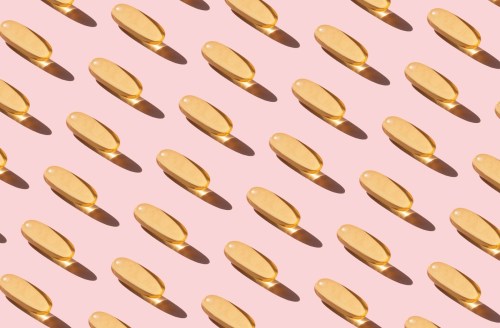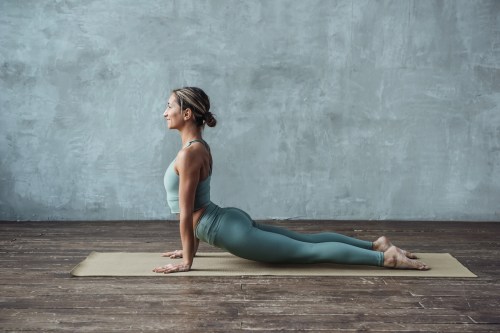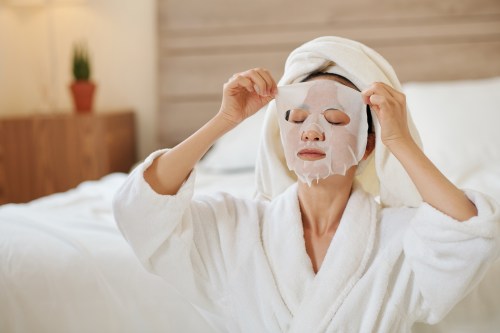Our editors independently select these products. Making a purchase through our links may earn Well+Good a commission
Sussing out the differences between all of the supplements that are on the market is an undertaking, to say the least. Not only are hundreds of options on the market (as anyone who has wandered the vitamin aisle at Whole Foods knows), but there is also a host of conflicting information available in terms of what will work best for you and your lifestyle.
One thing you can bet on? Fatty acids (think: omega-3s) need to be a part of your regimen. As practically any expert would tell you, fatty acids are crucial for optimal brain health, fighting inflammation, and promoting skin health. While there are certain food sources that contain various types of omega-3s, the territory becomes a bit stickier if you adhere to a vegan lifestyle. After all, popular fatty acid sources include fish oil supplements, as well as non-vegan foods like salmon and herring.
But one trending supplement, ahiflower oil, could be the plant-based answer you’ve been waiting for. Several companies, from Clean Machine to Source Naturals, are touting the supplement as a sustainable, vegan alternative. But is it as good for your health as the fishy original?
Here, Whitney English, MS, RDN, a dietitian and certified personal trainer in Los Angeles, weighs in on ahiflower, including what it is and how it will (or won’t) benefit your vegan diet.
What is ahiflower?
Ahiflower oil is derived from the corn gromwell plant (Buglossoides arvensis), a flowering plant that English says is mainly found in the United Kingdom. Known for being rich in the essential omega-3 fatty acid alpha-linolenic acid (ALA), ahiflower oil also contains high amounts of stearidonic acid (SDA). You’ll find SDA—a lesser-known omega-3 fatty acid—in other vegan staples, like hemp seed oil and spirulina.
How does ahiflower oil work, exactly?
Time to get nerdy for a second: All omega-3s work together with linolenic acid (an omega-6 fatty acid) to keep your brain, metabolism, blood sugar, and heart running smoothly. Your brain in particular prefers the long-chain type of omega-3s, specifically eicosapentaenoic acid (EPA), and docosahexaenoic acid (DHA), which are found in fish and other foods. When needed, your body converts ALA (a shorter-chain fatty acid) to EPAs and DHAs.
However, this conversion isn’t always super effective, English says. (There’s an estimated 15 percent success rate in most people.) That’s why nutrition experts typically recommended that you get your dose of those fatty acids from other sources, like certain types of fish (e.g. salmon, herring and oysters) or a DHA supplement. For vegans, however, that will mean something different (read: not fish or fish oil supplements).
This is where ahiflower oil potentially comes in. SDA can also be converted into EPA and DPA, and research shows that it’s a bit more efficient than ALA. Thus, ahiflower oil fans say its a more bioavailable source of omega-3s for vegans than traditional plant-based options.
These are the three supplements a top dietitian says every woman should consider taking:
So does ahiflower have the same benefits as fish oil?
Not quite. That’s because while ahiflower oil is rich in ALA and SDA, fish oil is also rich in EPA and DPA—no complicated conversion necessary. “Though not considered ‘essential’, these fatty acids are vital for proper brain and eye growth and functioning, and especially important for pregnant women,” English says.
That’s not to say it’s not beneficial—you’re still getting compounds that are crucial to promoting overall health. It can certainly be a good option for vegans. But it’s not likely that a person could reap equivalent benefits as they would from taking fish oil or eating foods rich in omega-3s.
“As EPA and DHA are only found in animal products and the conversion rate from ALA is so low, some vegans choose to supplement with algae oil, which is a plant-friendly source of these two important fatty acids,” English says. Other dietary sources of fatty acids that get the green light for vegans include hemp seeds, chia seeds, flax seeds, walnuts, seaweed, spirulina and chlorella.
The bottom line: Unlike a fish oil supplement, ahiflower oil only provides straight-up ALA, so don’t count on it replacing your daily dose of fish oil. But there’s certainly no harm in trying it if you’re plant-based or just hate tasting fish burps. Case closed!
Want to get more deets on other popular supplements? Here’s everything you need to know about ashwagandha. And hey, did CBD just totally jump the shark?
Sign Up for Our Daily Newsletter
Get all the latest in wellness, trends, food, fitness, beauty, and more delivered right to your inbox.
Got it, you've been added to our email list.











